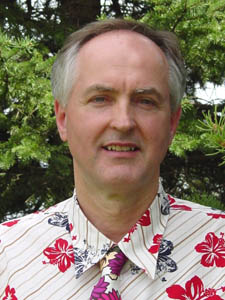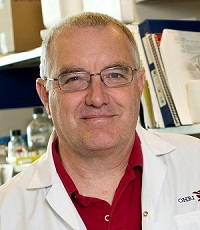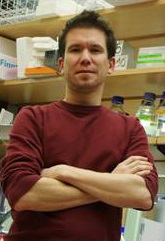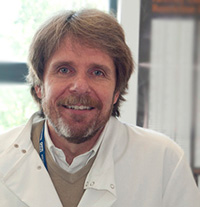uOttawa News
uOttawa Experts
Search Results
Your search for "Molecular biology" returned the following 17 expert(s):
ALTOSAAR, Illimar »

Full professor
Faculty of Medicine
Biochemistry, Microbiology and Immunology
Contact information:
Office: 6135625800 x 6371
Office: 6135625800 x 6375
Cell: 613 804 1885
Home: 613 518 7767
E-mail: altosaar@uOttawa.ca
Website
Preferred method of contact:
Research information:
New breeding techniques to fight global warming through climate-smart crops. Climate change, Greenhouse Gases, GHG, Global warming, carbon dioxide, CO2, Nitrous oxide, N2O, bioremediation, biotechnology, soil metagenome, soil microbiome, biodiversity, gene amplification, soil biocatalysts, Atmospheric phytoremediation, Pseudomonas nautica, Marinobacter hydrocarbonoclasticus, nosZ gene operon, Nitrous Oxide reductase enzyme, fertilizer, Nitrogen cycle, nitrate run-off,Area(s) of expertise:
(View other experts in this field)
- Biochemistry
- Biochemistry
- Biochemistry, microbiology and immunology
- Biopharmaceutical science
- Breastfeeding Medical Education
- Breastfeeding Promotion
- Climate change
- Global Warming
- Global warming
- Molecular biology
- Pediatrics
- Soils
Language preference:
English and French , Estonian Greek German
BELL, John »

Senior Scientist
Full professor
Faculty of Medicine
Biochemistry, Microbiology and Immunology
Contact information:
Office: 613-737-7700 (70333)
E-mail: jbell@ohri.ca
Preferred method of contact:
Research information:
My lab is defining at the molecular level, the differences between normal and tumour tissues. Our plan is to develop novel cancer therapeutics that target tumour tissue but do not harm normal tissue. We are developing viruses that can infect and kill tumour cells but do not infect normal cells. These viruses are called Oncolytic Viruses
Area(s) of expertise:
(View other experts in this field)
- Biochemistry
- Biochemistry, microbiology and immunology
- Cancer
- Cellular and molecular medicine
- Diseases
- Genetics
- Genetics
- Medical research
- Microbiology
- Molecular biology
- Molecular biology
- Virology
Language preference:
English only
BLAIS, Alexandre »

Associate professor
Faculty of Medicine
Biochemistry, Microbiology and Immunology
Contact information:
Office: 613-562-5800 (8463)
E-mail: alexandre.blais@uottawa.ca
Website
Preferred method of contact:
Research information:
Our research group studies how the control of gene expression determines cell identity. In particular, we aim at understanding how certain proteins regulate gene transcription in skeletal muscle stem cells during regeneration. To this end, we use an approach called functional genomics, where we study at the scale of the entire genome how proteins interact among each other and with DNA to control gene expression.
Area(s) of expertise:
(View other experts in this field)
Language preference:
English and French
CAMPBELL-VALOIS, François-Xavier »
Yes
Associate professor
Faculty of Science
Chemistry
Contact information:
Office: 3976
Cell: 819-968-3646
E-mail: fcampbel@uottawa.ca
Website
Preferred method of contact:
Cell Telephone
Research information:
My research group is interested in understanding the interplay established between bacteria and their host during infection.
We are currently focusing on the enteropathogen Shigella flexneri, which use a Type Three Secretion Apparatus (T3SA) to inject some of its proteins inside human intestinal cells. Our main interests are:
- T3SA functioning and regulation;
- bacterial strategies for hijacking the biological processes of the host;
- bacterial and host adaptation at play during infection. Our long-term objective is to identify novel therapeutic avenues to treat infectious diseases.
Keywords: gastrointestinal infections caused by bacteria of the Shigella genus and other Escherichia coli.
Area(s) of expertise:
(View other experts in this field)
Language preference:
English and French
DE LISIO, Michael »
Associate professor
Faculty of Health Sciences
School of Human Kinetics
Contact information:
Office: 562-5800 ext.6987
E-mail: mdelisio@uottawa.ca
Preferred method of contact:
Research information:
Work in my lab focuses on the effects of exercise and nutrition on blood and muscle forming stem cells.Area(s) of expertise:
(View other experts in this field)
- Cancer
- Human kinetics
- Kinesiology
- Molecular biology
- Muscle mechanics
- Obesity
- Preventive medicine
- Stem cells
Language preference:
English only
GHOBADLOO, Shahrokh »
Support staff member
Faculty of Science
Contact information:
Office: 6139790751
E-mail: Shahrokh.Ghobadloo@uottawa.ca
Preferred method of contact:
Research information:
My main current activity at Flow Cytometry and Robotic Facility of Cellular Imaging and Cytometry Facility (CICF) is providing service to research groups inside and outside the University of Ottawa. I have researched in the field of Molecular biology, molecular interactions, viruses, genetics, cancer, and clinical biochemistry.Area(s) of expertise:
(View other experts in this field)
Language preference:
English only
GRAY, Douglas »

Senior Scientist
Full professor
Faculty of Medicine
Biochemistry, Microbiology and Immunology
Contact information:
Office: 613-737-7700 x70331
E-mail: dgray@ohri.ca
Website
Preferred method of contact:
Research information:
My laboratory studies the molecular biology of aging and diseases associated with aging (neurodegenerative diseases and cancer). Our primary focus is on the role of declining protein degradation efficiency in aging. Our research makes extensive use of transgenic mouse models, cell culture systems, and live cell imaging.Area(s) of expertise:
(View other experts in this field)
Language preference:
English only
ISMAIL, Nafissa »
Full professor
Faculty of Social Sciences
School of Psychology
Contact information:
Cell: 819-384-3424
E-mail: nafissa.ismail@uottawa.ca
Website
Preferred method s of contact:
E-mail, Cell Telephone
Research information:
- Understanding the different COVID-19 variants and their impact on our society and children.
- Effects of enduring stress (like the COVID-19 pandemic and sanitary restrictions) on brain health.
- Mechanisms of sex differences in psychological and neurological illnesses.
- Sex differences in COVID-19 symptoms and in the prevalence of long-COVID.
- Impact of chronic stress in adolescences.
- Building resilience to stress.
- The link between the gut microbiome and brain functioning.
Area(s) of expertise:
(View other experts in this field)
- Adolescent mental health
- Animal behaviour
- Biopharmaceutical science
- Cognition
- Developmental biology
- Immunology
- Molecular biology
- Neuroscience
- Psychopathology
- Sex/sexuality
- Stress
Language preference:
English and French
LANGLOIS, Marc-André »
Canada Research Chair in Molecular Virology and Intrinsic Immunity
Assistant professor
Faculty of Medicine
Biochemistry, Microbiology and Immunology
Contact information:
E-mail: langlois@uOttawa.ca
Website
Preferred method of contact:
Research information:
HIV, Retroviruses and Immunity
Area(s) of expertise:
(View other experts in this field)
- Biochemistry
- Biochemistry, microbiology and immunology
- Health research
- Immunology
- Infectious Diseases
- Medical research
- Microbiology
- Molecular biology
- Research methods
- Virology
Language preference:
English and French
LEE, Seung-Hwan »
Assistant professor
Faculty of Medicine
Biochemistry, Microbiology and Immunology
Contact information:
Office: 613-562-5800 (8868)
Cell: 613-851-8781
E-mail: seunglee@uOttawa.ca
Preferred method of contact:
Research information:
Although there are many immune system responses against viral infections, Natural Killer (NK) cells are unique because of their rapid anti-viral responses to infections in comparison to other immune cells. My research is focusing on identifying and defining the involvement of natural killer (NK) cells during chronic viral infections. We are integrating multiple disciplines to investigate what NK cells can do during chronic viral infection and to find new insights for treatment.
Area(s) of expertise:
(View other experts in this field)
Language preference:
English only
RUDNICKI, Michael »
Senior Scientist & Director
Full professor
Faculty of Medicine
Medicine
Contact information:
Office: 613-739-6740
E-mail: mrudnicki@ohri.ca
Preferred method of contact:
Research information:
We are interested in how genes regulate the function of stem cells. In particular, we work to identify the regulatory networks that regulate stem cell growth and regulate cellular differentiation.Area(s) of expertise:
(View other experts in this field)
Language preference:
English only
SHEHATA, Marlene Fouad »
Prof., Pharmacist and PhD candidate in Genetics of Cardiovascular Diseases
Part-time professor
Faculty of Health Sciences
Medicine
Contact information:
Office: 613-255-5476
Cell: 613-255-5476
Home: 613-255-5476
E-mail: mshehata@ottawaheart.ca
Preferred method of contact:
Cell Telephone
Research information:
My main field of research is targeting the salt-sensitive high blood pressure. This particular kind of high blood pressure has been connected with a genetic component that is inherited from parents to offspring and that is usually exacerbated by high salt-intake. As a Geneticist Candidate and a Pharmacist, I am investigating the genes that might be involved in transmitting that genetic form of high blood pressure.
Area(s) of expertise:
(View other experts in this field)
- Biochemistry
- Biochemistry
- Biochemistry, microbiology and immunology
- Biopharmaceutical science
- Cancer
- Genetics
- Genetics
- Health
- Health-service providers
- Inorganic chemistry
- Medical research
- Medicinal chemistry
- Molecular biology
- Organic chemistry
- Pharmacology
- Physiology
Language preference:
English only
STEFANELLI, Gilda »
Assistant professor
Faculty of Science
Biology
Contact information:
Office: +1 647-574-714
Cell: +1 647-574-714
E-mail: gilda.stefanelli@uottawa.ca
Preferred method s of contact:
E-mail, Cell Telephone
Research information:
I study how the brain develops and what goes wrong at the genetic and molecular level in children with neurodevelopmental disorders, such as autism. My research focuses on how changes in DNA packaging and gene regulation (known as epigenetics) can disrupt brain development. By combining experiments in brain cells and mouse models with cutting-edge genetic technologies, we aim to uncover the root causes of these conditions and identify new targets for therapy.
Area(s) of expertise:
(View other experts in this field)
Language preference:
English and French
TESSON, Frédérique »
Director, Laboratory of Genetics of Cardiac Diseases
Assistant professor
Faculty of Medicine
University of Ottawa Heart Institute
Contact information:
Office: 613-798-5555 (16341)
Office: 613-798-5555 (14559)
E-mail: ftesson@ottawaheart.ca
Website
Preferred method of contact:
Office Telephone
Research information:
Determination of genes involved in the development of heart failure. Determination of genes involved in obesity and diabetes.
Area(s) of expertise:
(View other experts in this field)
Language preference:
English and French
TRINKLE-MULCAHY, Laura »
Dr.
Assistant professor
Faculty of Medicine
Cellular and Molecular Medicine
Contact information:
Office: 613-562-5800 (8068)
E-mail: ltrinkle@uOttawa.ca
Website
Preferred method of contact:
Research information:
The typical mammalian cell expresses thousands of proteins, over a third of which are regulated by the reversible addition of a phosphate group. My laboratory studies the targeting and regulation of PP1, one of the key enzymes in the cell that removes these phosphate groups. By studying this phosphatase in living cells using cutting edge fluorescence microscopy techniques and novel methods for identifying protein complexes, we can define its roles in diverse intracellular signalling pathways and how it may be disrupted in disease states such as cancer and diabetes.
Area(s) of expertise:
(View other experts in this field)
Language preference:
English only
VANDERHYDEN, Barbara »

Corinne Boyer Chair in Ovarian Cancer Research
Full professor
Faculty of Medicine
Cellular and Molecular Medicine
Contact information:
Office: 613-737-7700 (70330)
E-mail: bvanderhyden@ohri.ca
Website
Preferred method of contact:
Research information:
Ovarian cancer, notably the cellular and molecular mechanisms that are important for the initiation and progression of ovarian tumours. Testing of novel therapeutics against ovarian cancer in women and in animal models of ovarian cancer. Transgenic (genetically modified) animals. Science education and outreach: Let's Talk Science program.
Area(s) of expertise:
(View other experts in this field)
- Animal physiology
- Cancer
- Cellular and molecular medicine
- Developmental biology
- Molecular biology
- Physiology
- Women’s health
Language preference:
English only
XIA, Xuhua »
Full professor
Faculty of Science
Biology
Contact information:
Office: 6135625800 x6886
Office: 6135625800 x2527
Cell: 613-204-2347
Home: 6138300115
E-mail: xxia@uottawa.ca
Website
Preferred method of contact:
Research information:
I study 1) how genes change, and how the interaction of gene products change, over geological time, 2) how mutation and selection.shape such changes, and 3) how to trace natural history back to time immemorial by identifying the footprints left by mutation and selection on DNA.Area(s) of expertise:
(View other experts in this field)
Language preference:
English only, Chinese
Find an Expert
Search our database of more than 500 University of Ottawa experts, who can comment on current events or share their expertise for news features.
Hint: Searches are not case sensitive and word fragments are accepted.
Sub-categories for "Biology"
Create or edit your profile
University of Ottawa professors and researchers who wish to be included in uOttawa Experts are invited to sign up or to edit their profile.
Login Sign up